- Home
- James Luceno
Hero's Trial: Agents of Chaos I Page 12
Hero's Trial: Agents of Chaos I Read online
Page 12
Roa was shaking his head when Han looked at him. “Anobis is only a side-door entry to our final destination. A direct jump might have landed us in the midst of an enemy flotilla or an Imperial Remnant patrol.” He aimed a thick finger out the starboard viewport. “Take a look at that.”
Han swiveled to the right. Almost close enough to touch floated the holed and battle-scorched remains of a Star Destroyer. Listed to port and nimbused by debris, the great ship’s command tower and pointed bow had been blown away. Her once-gleaming aft plating was pockmarked by immense blackened craters. Power cables and ducting trailed from her ruptured innards. Han thought back to the attack on Yuuzhan Vong–held Helska 4 and the Star Destroyer Rejuvenator that had gone down with nearly all hands aboard.
“Do we have a fighting chance against these thugs?” Roa asked.
“The Yuuzhan Vong wouldn’t have it any other way.” Han swung from the view. “So just where are we going, Roa?”
Roa tapped his forefinger on a star chart he called up on a display screen. “Ord Mantell.”
Han’s mouth fell open a bit, then he threw his head back and launched an explosive laugh at the ceiling.
Roa regarded him quizzically. “Worried about running into someone from your past?”
“Someone from the here and now,” Han muttered. “My wife.”
Ord Mantell was still the same undistinguished sphere Han remembered from previous visits, which had been many over the years, some intentional, more by misadventure. But something new had been added since Han’s stint as grand marshal of the Blockade Runners Derby: a small space station of outmoded ring design, pieced together from salvaged and Hutt-supplied parts by a consortium of Mid Rim engineering companies. Parts of the station—two of its spokes and perhaps ten degrees of the outer ring—were still incomplete, and were likely to remain that way for some time to come, since construction crews had abandoned the project after the destruction of Ithor.
The Jubilee Wheel, Roa called it.
“Except for the gravitation debt, the station doesn’t have much to do with Ord Mantell,” he told Han from the pilot’s seat of the Happy Dagger. “It was a free port. A highly successful one, until the Yuuzhan Vong invasion put a damper on trade. Now it’s a transit point, filled with some of the most desperate types you’re ever likely to meet.”
“Long as our business doesn’t take us down the well, I’m ready for anything,” Han said. “It’s Ord Mantell that’s been bad luck for me.”
Roa nodded. “Then we’ll have to do our best to keep our feet from touching the ground.”
Awaiting docking assignments, ships of all types were queued up around the station. Some were empty freighters and barges with nowhere to go—their home ports occupied by the Yuuzhan Vong or their holding companies bankrupted by the war—filled with half-starved spacers caught in a political no-man’s-land. Others were fifty-year-old crimson-red diplomatic cruisers, and warships recently recommissioned from mothballed fleets. Then there were the passenger transports—including several shallow bowl-shaped Ithorian herd ships—crammed with displaced beings from conquered or immolated worlds, also in search of some planet to call home, even temporarily. And catering to the needs of those refugees with credits to spend were aged scows and tenders, crewed by pirates selling dreams of a new life to the blindly optimistic.
Waiting for clearance, Roa and Han passed the time running checks on the SoroSuub 3000’s security systems and generally battening down the hatches. The crowded and filthy docking bay the ship was finally allocated had been salvaged from an MC80 cruiser and, in fact, still bore some of the original Mon Calamari markings.
First down the ramp, while Roa saw to lockdown procedures, Han was confronted by a group of five aliens of a species he had never encountered.
“You need perhaps someone to watch over your ship?” their spokesman asked above the din, in whistling, heavily accented Basic.
Han eyed the alien up and down. “I need perhaps someone to watch over you.”
The alien—clearly a male—took a moment to catch on, then laughed loudly, a hearty, basso laugh that almost made Han smile.
A head shorter than Han, he was a biped with muscular legs and a slender yet useful-looking tail. Those parts of him left unconcealed by a colorful vest and strategically slit culottes were covered with short, smoke-colored fuzz, save for the backs of his forearms and tail, where the hair was darker in hue, stiff as slender rods, and possibly capable of inflicting damage.
Like the two other males in the group, the one who approached Han had a soft snow-white mustache that drooped past his pointed chin, and a fright wig of matching white hair. His front-facing eyes were large and bright; his nose was a chitinous beak that curved down over a thin-lipped mouth and was perforated like a musical instrument.
Slightly smaller than the males, the two women of the group were about the same size, with shapely curves to their compact bodies and splashes of vibrant color highlighting velvety, taupe coats. They lacked the drooping mustachios, and in place of crests had lustrous slicked-back hair that fell to the shoulders. The tips of their smooth tails looked as if they had been dipped in sky-blue paint. Jewelry of a sort hung in loops from their long necks, accented their small ears and five-fingered hands, and studded their nostrils.
“All right, all right,” their mouthpiece was saying, “you perhaps prefer to have someone clean and detail the ship?”
Han put his hands on his hips and laughed. He was still sniggering when Roa came down the ramp followed by two of the Happy Dagger’s crew—Void and an EV supervisor droid, whose head resembled the curving bill of a large, fruit-eating avian.
“Roa, you want to hire this bunch to sonic the carpets and clean the ’freshers?”
Roa regarded the aliens with keen interest. “That’s what the droids are for,” he told the spokesman.
“Then we watch over the ship. Lots of thieves about.”
“I do appreciate the offer,” Roa said congenially, “but no thanks. Some other time, perhaps.”
The aliens exchanged words in their melodic native language, nodded to Han and Roa, and moved off toward the neighboring ship in the bay, an old Sienar Marauder-class corvette.
“It’s like somebody tossed a manka cat and a woolamander into a blender,” Han said, watching the aliens.
“Ryn,” Roa said, identifying the species. “I used to run into them occasionally on out-of-the-way worlds in the CorpSec—Ession, Ninn, Matra VI. They’re nomads—that is, when they’re not being hunted or enslaved, chased from one place to another, or made the scapegoat for someone else’s crimes or misdemeanors. They’ve a reputation for thievery and confidence games, but I’ve never had a problem with them. They work hard, at just about any trade, from ship salvaging to jewelry making. And I’ll tell you, Han, they perform the most exhilarating music I’ve ever heard—music you can’t help but dance to.”
“I’m sure I could stop myself,” Han said.
“No, not even you could. I’m not talking about jizz or any of the new music. I mean fiery, passionate music.”
Han gave them another look. “Where’s their homeworld?”
Roa shook his head. “No one’s ever been able to tell me.”
Han laughed through his nose. “Just when you think you’ve seen it all.”
Leaving the droids in charge, they headed for immigration and customs, where long lines of mixed species were undergoing document checks and security scans.
Han showed his documents, which identified him as Roaky Laamu, a freelance laser-welder. He had considered wearing a disguise—synthskin, prosthetics, a beard—but in the end had opted for simply changing his hairstyle and leaving his face undepilated. He had often used the same approach when traveling with Leia and the kids, and it had usually served him well. After all, most circulated images of him depicted a youthful Alliance leader, with bright eyes, sideburns, and a mop of shiny brown hair.
Things didn’t go awry until he reached the
scanners.
“Open your pack,” the young agent ordered in response to a prompt from the droid he was partnered with.
Han unsealed the pack, and the agent quickly located the blaster, its large scope and conically shaped flash suppressor stowed in a separate case.
“Is this a DL-44?” he asked incredulously.
“More or less,” Han said. “I’ve made some special modifications—”
The agent laughed and got the attention of a human coworker. “Boz, does this classify as a weapon or an antique?”
“Antique,” Boz answered around a broad smile.
“Laugh it up, fellas,” Han said, refraining from boasting about the blaster’s capabilities.
The agent glanced at Han’s identity documents. “Either way, Laamu, I’ve got to drain the power pack.”
Han put his tongue in his cheek, then shrugged. “Long as you’ve done that with the other weapons that have come through.”
“All the ones we’ve discovered,” the agent said.
“That’s comforting.”
“We’re looking for the Bet’s Off?” Roa asked while the agent was fitting a depletor to the power pack.
“Assuming you two have normal-spectrum vision, Red route to the Yellow tram to White Two, then all the way down the Shaft. You can’t miss it.”
“What do you tell the color-blind?” Han said nastily.
The agent placed the depleted blaster in the travel pack and resealed it. “I tell them to take a cab.”
Roa insisted on taking a cab. Their Sullustan driver was a former ambassador to Ithor, marooned on the Jubilee Wheel waiting for transit documents to arrive from his homeworld.
“It’s the same story over and over,” Roa told Han when the cab had dropped them off in White Two. “Some trying to get home, some fleeing their homes, some without homes—and rarely the required documentation to get them off station, let alone transport to their desired destinations. So you find diplomats working as drivers, university professors tending bar, important types from you-name-it waiting tables or risking their savings on sabacc games—most of which are rigged.”
In the Shaft, they made their way through a mixed-species crowd of hopeless folks—Ithorians, Saheelindeeli, Brigians, Ruurians, Bimms, Dellaltians—refugees from up and down the Hydian Way, clutching meager possessions to their torsos or holding tight to their children, shuffling aimlessly, in search of the miracle that was going to get them off the Wheel, as many referred to the station. People huddled in the shadows, hungry, trapped, and wary. Elsewhere prowled the ones the war had elevated: uniformed soldiers, reclamation and salvage experts, document forgers, scavengers, scammers, relief flyers, and the rest.
Han recalled what Leia had said about the refugee situation, about the lack of food and shelter, the diseases, the separation of families, and it began to dawn on him that he wasn’t the only one in a bad way.
He was still mulling it over a short time later, while he and Roa sipped Gizers in the Bet’s Off, a crowded and somewhat elegant tapcaf, with a back room devoted to sabacc and other games of chance.
“Time I started making some inquiries,” Roa announced when he’d finished his drink. He stood up and squared his shoulders. “I won’t be long.”
Han watched him move off in the direction of the circular bar, then returned his attention to the pale-blue ale. Movement caught his eye, however, and when he glanced up, two Ryn males were standing at the table, darker and better dressed than the ones he had met in the docking bay.
“You’ll pardon the intrusion,” the taller one said in a trilling voice, “but you’re off the recently arrived Soro-Suub 3000?”
Han extended his arms over the backs of the chairs adjacent to his. “Word gets around fast. What of it?”
“Well, kind sir,” the other took over, “we were wondering—that is, Cisgat and myself—if your onward travels might be taking you in the vicinity of Rhinnal, or perhaps if you could be induced, for an equitable sum, to carry some passengers there.”
“Sorry, boys, but we’re not Core bound.”
The two exchanged concerned glances.
“Perhaps if we explained,” Cisgat said. “You see, this is a matter of some urgency. We were to rendezvous here with other members of our extended family, but there seems to have been a problem, and they have not arrived.”
“Our contingency plan called for us to meet on Rhinnal,” the other added, “but, as is the case with so many on the Wheel, we find ourselves marooned here, with dwindling resources and little hope of securing onward transportation.”
“We fear our clanmates may move on from Rhinnal without being able to get word to us.”
Han folded his arms over his chest. “I’m sorry to hear that your family’s scattered, but it’s like I told you—”
“We can pay you well.”
“We won’t cause you any problems.”
“Hold it,” Han said loudly. “I said I’m sorry. But I’m out of the rescue business, you understand?”
The pair fell silent for a long moment. “We, too, are sorry to hear that,” the tall one remarked.
Han angrily drained his drink as the Ryn walked off. No sooner did he set the glass down than Roa returned.
“What did they want?”
“A ride to Rhinnal.”
Roa frowned and sat down. “As I said, everyone’s desperate.”
“D’you learn anything?”
Roa nodded his chin toward a rangy, red-haired spacer who was approaching from the bar with a drink in hand. “Roaky Laamu, meet Fasgo,” he said as the man took a chair and extended his hand to Han. “Just make sure to count your fingers when you’re done shaking.”
Fasgo grinned broadly, showing stained teeth, and took a long swallow from the ale Roa had obviously paid for.
“Fasgo was one of my best tax-and-tariff boys,” Roa continued. “Just ask him and he’ll tell you. Since he left my employ, he’s had occasion to work with Reck Desh.”
Han watched Fasgo’s smile collapse.
“Any idea where Reck can be found?” Roa asked pleasantly.
Fasgo swallowed hard. “Look, Roa, I appreciate your buying me a drink, but—”
“Roaky and I know all about Reck’s new employers,” Roa cut him off, “so there’s no need to feed us a tale.”
Fasgo licked his lips and forced a short laugh. “You know Reck, Roa, he follows the credits.”
Han put his elbows on the table. “If the pay’s all that good, how come you’re not still with him?”
“Not my style,” Fasgo said, shaking his head. “I’m no traitor.”
Han and Roa glanced at each other. “So what about Reck?” Roa said.
Fasgo shook his head once more. “I don’t know where he is now.” Gauging the look in Han’s eyes, he added, “I’m being straight with you guys, I don’t know.” He glanced around and leaned forward conspiratorially. “There is someone on station who can probably tell you. He runs things around here—the underground things. They call him Boss B.”
“And just where do we find this Boss B?” Roa said.
Fasgo made his voice a whisper. “Ask around for him and he’ll find you.”
As the spacer was about to rise, Han laid a restraining hand on his shoulder. “Who’s running Reck’s enterprise? Who’s his control?”
The color drained from Fasgo’s face. “You don’t want to meet them, Roaky. They’re nasty as they come, and then some.”
“Give me a name?”
“I never learned any names—honest.” Fasgo swallowed whatever else he was about to say and riveted his gaze on something over Han’s shoulder.
Han twisted around to see three Trandoshans moving toward the table, armed with Merr-Sonn and BlasTech blasters and wearing knee-length climate-control coveralls. While two came to a halt on either side of his chair, the largest of the saurian trio—older, by the look of his graying skin—circled the table twice, never taking his black-pupiled, red eyes from Han. Eve
ntually, he took up a position directly across from him.
“Now, you look very familiar,” he rasped. His long tongue emerged from a lipless mouth and wriggled in the air for a moment. “And you taste even more familiar.”
Han forced himself to relax. While the Trandoshan had clearly recognized him, Han wasn’t sure if he and the alien had ever crossed paths. Native to a world in the same star system as Kashyyyk, the brackish-smelling Trandoshans had been instrumental in persuading the Empire to enslave the Wookiees and had often worked as slavers themselves.
“Last time I saw a tongue like that it was hanging in a meat market collecting stink-flies,” Han said.
The Trandoshan’s death trap of a mouth approximated a baleful smile, and he planted his triple-clawed hands on the table. “Now, the human you resemble has since become a very important person, but when I knew him he was just a second-rate smuggler, running spice for Jabba the Hutt and anyone else witless enough to employ him.”
Bossk? Han wondered. Could it possibly be … “Ah, you must have been the cutest little egg at the time,” he goaded.
Conversation at surrounding tables was quieting, as patrons tried to determine if they should stay seated for the rest of the show or seek cover as quickly as possible.
“Among other dishonorable acts, this piece of human filth once interfered with a legitimate slaver operation on Gandolo IV.”
Roa shifted in his seat and spoke up. “What’s past is past, big guy. Or is it that you’re so short on hunter’s points you’ve got to disturb a couple of old friends sharing drinks?”
The Trandoshan glowered at Roa, then Han. “I don’t know this fat one, but I do know you—Han Solo.”
“Solo?” Fasgo said in astonishment.
Han held the Trandoshan’s gaze. It had to be Bossk. He could only hope that the E-11A1 the alien wore on his hip had been drained at customs.
“Tell me, Solo, are you still sticking your twisted beak in the business of others?”
Han smiled lopsidedly. “Only when there’s the chance of wrecking someone’s starship and humilating her captain while I’m at it.”

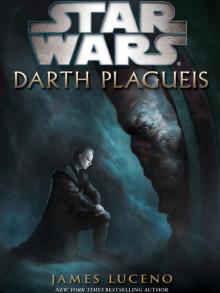 Darth Plagueis
Darth Plagueis Memories End
Memories End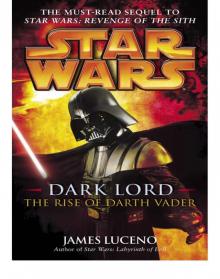 Star Wars: Dark Lord: The Rise of Darth Vader
Star Wars: Dark Lord: The Rise of Darth Vader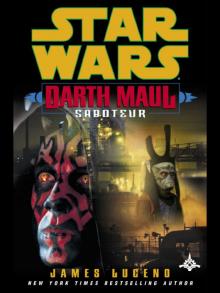 Star Wars Darth Maul: Saboteur
Star Wars Darth Maul: Saboteur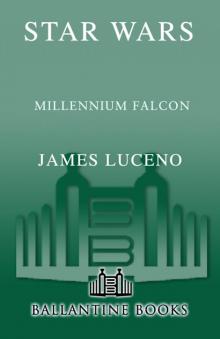 Star Wars: Millennium Falcon
Star Wars: Millennium Falcon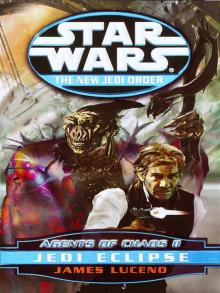 Jedi Eclipse
Jedi Eclipse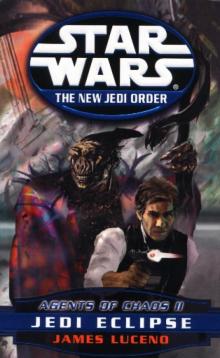 Star Wars The New Jedi Order - Agents of Chaos II - Jedi Eclipse - Book 5
Star Wars The New Jedi Order - Agents of Chaos II - Jedi Eclipse - Book 5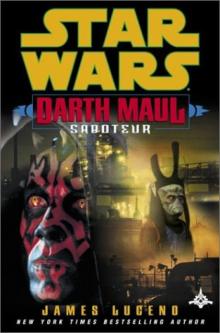 Star Wars - Darth Maul - Saboteur
Star Wars - Darth Maul - Saboteur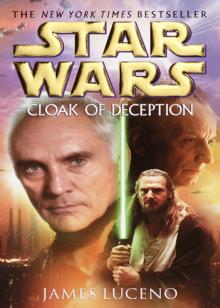 Star Wars: Cloak of Deception
Star Wars: Cloak of Deception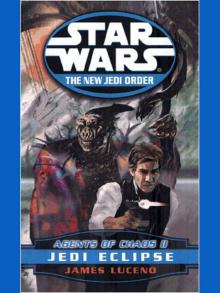 Star Wars: New Jedi Order: Agents of Chaos II: Jedi Eclipse
Star Wars: New Jedi Order: Agents of Chaos II: Jedi Eclipse End Game
End Game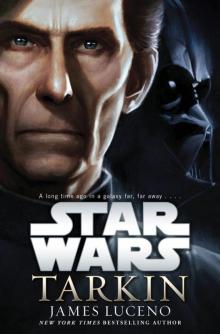 Tarkin: Star Wars
Tarkin: Star Wars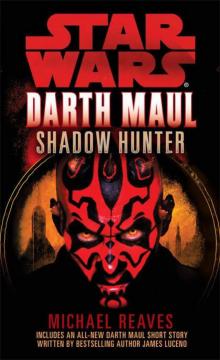 Restraint
Restraint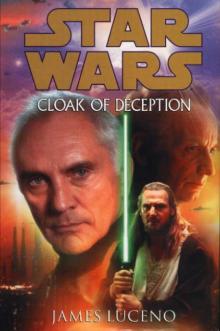 Star Wars - Cloak Of Deception
Star Wars - Cloak Of Deception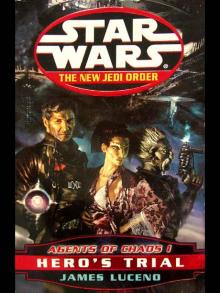 Star Wars: New Jedi Order: Agents of Chaos I: Hero's Trial
Star Wars: New Jedi Order: Agents of Chaos I: Hero's Trial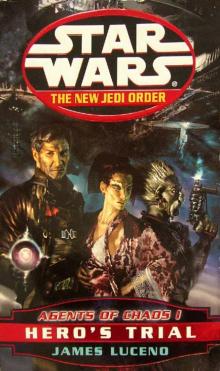 Star Wars The New Jedi Order - Hero's Trial - Book 4
Star Wars The New Jedi Order - Hero's Trial - Book 4 The Essential Novels
The Essential Novels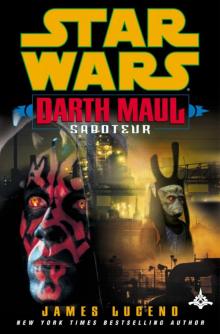 Darth Maul: Saboteur
Darth Maul: Saboteur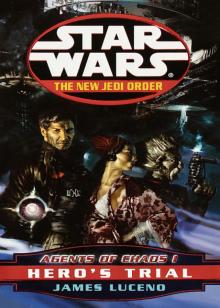 Hero's Trial: Agents of Chaos I
Hero's Trial: Agents of Chaos I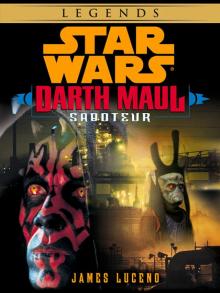 Saboteur
Saboteur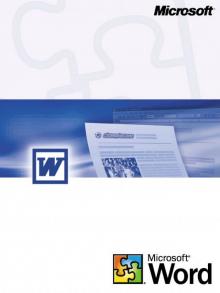 The Unifying Force
The Unifying Force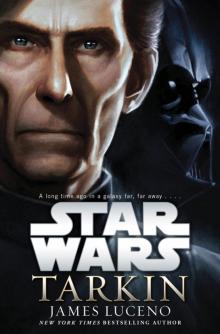 Tarkin
Tarkin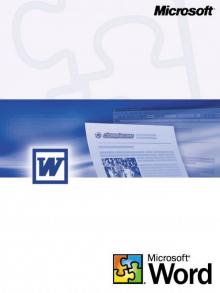 Dark Lord : The Rise of Darth Vader
Dark Lord : The Rise of Darth Vader Catalyst
Catalyst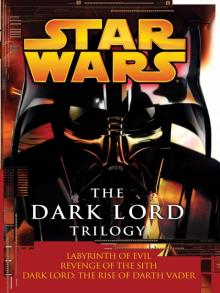 Book 0 - The Dark Lord Trilogy
Book 0 - The Dark Lord Trilogy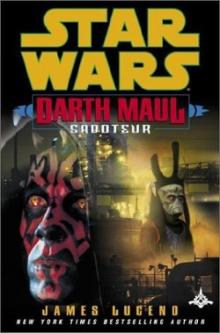 Darth Maul: Saboteur (star wars)
Darth Maul: Saboteur (star wars)